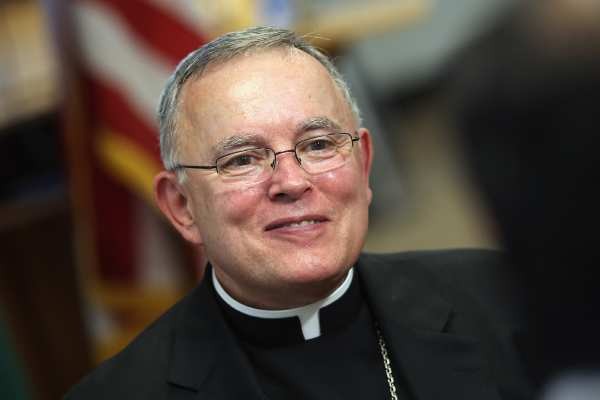Los Angeles Times
July 30, 2011
http://www.latimes.com/news/opinion/la-ed-chaput-20110730,0,225217.story?track=rss
 |
| Catholic Archbishop Charles J. Chaput was announced as the Archbishop-designate for the diocese of Philadelphia, one of the country's largest dioceses in the United States. (John Moore / Getty Images) |
The new Roman Catholic archbishop of Philadelphia seems to owe his appointment primarily to his perceived ability to move the archdiocese beyond a prolonged sexual abuse scandal. But the accession of Archbishop Charles Chaput also elevates the hierarchy's most forceful advocate of holding Catholic politicians to account for "anti-Catholic" positions. With a larger pulpit, Chaput's voice will be amplified in the 2012 presidential campaign.
Recent years have seen a rise in efforts by Catholic prelates to criticize politicians whose positions, especially on abortion, conflict with the church's. A common sanction is a declaration that a politician not take Holy Communion, a suggestion Chaput made to Joe Biden in 2008.
Demanding that Catholic politicians in effect vote the church's way is not the preserve of conservative Catholics. Earlier this year, a group of liberal Catholics effectively accused House Speaker John A. Boehner (R-Ohio), who had been named commencement speaker at Georgetown University, of being a faithless Catholic. Referring to Republican budgets that Boehner had supported, the critics wrote: "Mr. Speaker, your voting record is at variance from one of the church's most ancient moral teachings."
In 1960, at a time of widespread anti-Catholicism, Democratic presidential candidate John F. Kennedy told a group of Protestant ministers that "I believe in an America where the separation of church and state is absolute — where no Catholic prelate would tell the president (should he be Catholic) how to act, and no Protestant minister would tell his parishioners for whom to vote." Chaput has called the speech "sincere, compelling, articulate — and wrong." He criticized contemporary Catholic politicians for following Kennedy in living their faith "as if it were a private idiosyncrasy — the kind that they'll never allow to become a public nuisance." (It's one thing, however, for a politician to allow his faith to guide his public career, and another to vote against his convictions or those of his constituents because of a religious leader's orders.)
Does the "post-Kennedy" approach of bishops such as Chaput threaten to harm Catholic candidates in the way JFK feared? The damage to credibility with non-Catholics might be significant if Catholic politicians unwaveringly followed the church's instructions. In fact, strictures by Catholic leaders generally have been ignored.
Chaput and colleagues who would redefine the separation of church and state will discover that Catholic candidates and officeholders still hold to the Kennedy doctrine, even if the bishops don't.
Any original material on these pages is copyright © BishopAccountability.org 2004. Reproduce freely with attribution.